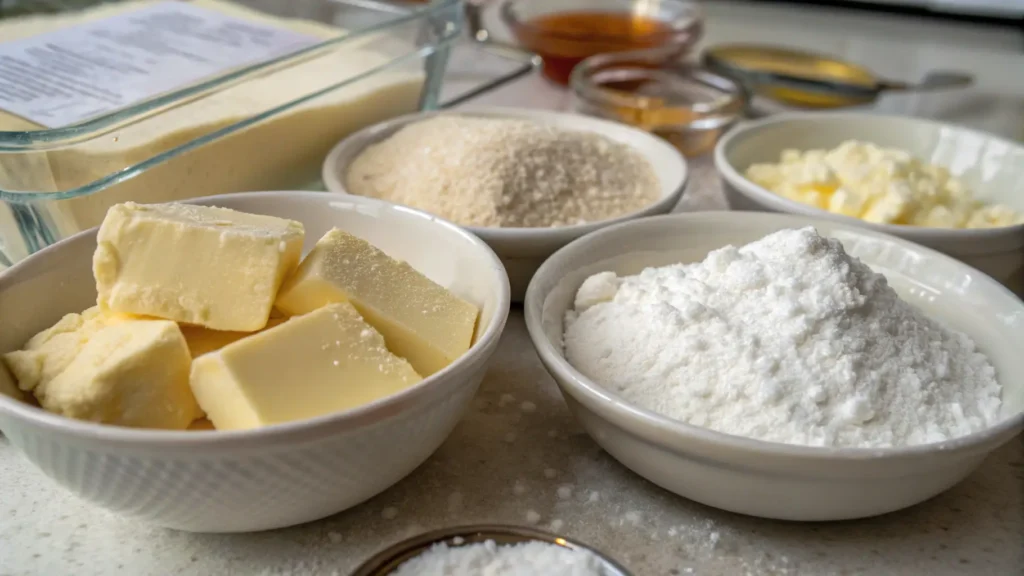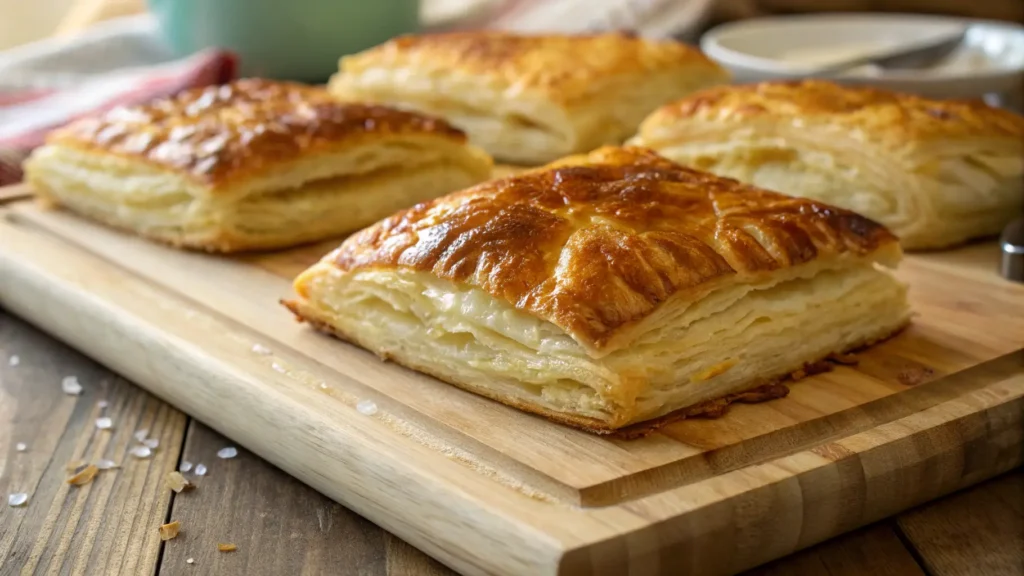Puff pastry is a flaky, delicious treat that graces many kitchens, from bakeries to home cooks. Whether in the form of pastries, pies, or appetizers, it’s a favorite for many. But as more people become aware of the role food plays in our health, questions arise: Is puff pastry inflammatory? What does it do to your body, and should it be avoided if you’re concerned about inflammation?
In this article, we’ll dive deep into the connection between puff pastry and inflammation. We’ll look at the science behind it, the ingredients that may trigger inflammation, and whether puff pastry is a friend or foe when it comes to your health. If you’ve been wondering about this flaky pastry’s effect on your body, you’re in the right place. Let’s get started.
Table of Contents
Is puff pastry inflammatory?
What is Puff Pastry?
Puff pastry is a light, flaky dough used in a variety of sweet and savory baked goods. It is made by layering butter between sheets of dough, then rolling and folding it multiple times to create thin, crisp layers. This process results in a pastry that “puffs” up when baked, giving it its signature flaky texture. While puff pastry can be delicious, its high fat and calorie content has led some to question its health impact.
The Debate Around Inflammation and Diet
Inflammation is a natural response by the body’s immune system, typically triggered by injury or infection. However, when inflammation becomes chronic, it can lead to a host of health issues, including arthritis, heart disease, and digestive disorders. Diet plays a significant role in managing inflammation, and many people are turning to anti-inflammatory foods to reduce its effects. In this context, processed foods like puff pastry, which are rich in fats, sugars, and preservatives, might be a cause for concern. So, does puff pastry contribute to chronic inflammation? Let’s find out.
Discover what to avoid when using puff pastry in your recipes to make healthier choices.
Understanding Inflammation and Diet

What is Inflammation?
Inflammation is a defense mechanism by the body against harmful stimuli, such as bacteria, injury, or toxins. It helps protect the body and starts the healing process. However, when this response becomes prolonged or excessive, it can become harmful. Chronic inflammation is linked to a variety of diseases, such as heart disease, cancer, and autoimmune disorders. In this way, inflammation can negatively impact the body if not properly managed.
Chronic vs Acute Inflammation
Acute inflammation is the body’s immediate response to injury or infection, and it typically subsides once the injury heals. On the other hand, chronic inflammation lasts for an extended period of time and can be triggered by various factors, including poor diet, environmental toxins, or ongoing stress. Chronic inflammation is linked to conditions like arthritis, heart disease, and diabetes. It’s important to understand that diet plays a significant role in whether inflammation remains acute or becomes chronic.
Puff Pastry and Inflammation: What Does Science Say?
Ingredients That Can Trigger Inflammation
Puff pastry contains several ingredients that may contribute to inflammation, such as butter, white flour, and refined sugar. Butter, while delicious, is high in saturated fat, which has been shown to trigger inflammatory responses in the body. White flour, a refined carbohydrate, lacks fiber and can cause spikes in blood sugar, leading to an inflammatory response. Meanwhile, sugar can contribute to the production of pro-inflammatory chemicals known as cytokines. So, when you consume puff pastry, you may be inadvertently consuming ingredients that promote inflammation.
The Link Between Trans Fats and Inflammation
Another potential culprit in puff pastry is trans fats. These unhealthy fats are often used in processed baked goods to improve texture and shelf life. Studies have shown that trans fats contribute significantly to inflammation by increasing the production of inflammatory markers in the body. While not all puff pastry recipes contain trans fats, some commercially produced versions may use them. This means that eating puff pastry made with trans fats could worsen inflammation and other related health issues.
Does Puff Pastry Cause Inflammation?

Puff Pastry’s Nutritional Breakdown
A single serving of puff pastry can contain high amounts of fat, especially saturated fat. Depending on the brand and recipe, it may also include trans fats, added sugars, and preservatives. These ingredients, as we’ve discussed, are known to promote inflammation. For example, a typical puff pastry serving can pack up to 300-400 calories, with 15-20 grams of fat, depending on how much butter or margarine is used. When consumed frequently or in large amounts, these fats can contribute to systemic inflammation, especially in those with pre-existing conditions like heart disease.
The Impact of Puff Pastry on Inflammatory Markers
Several studies have shown that high-fat, processed foods can lead to increased levels of C-reactive protein (CRP), a biomarker for inflammation. This means that regularly consuming puff pastry could raise your body’s CRP levels, leading to an increased risk of chronic inflammation. While occasional indulgence in puff pastry might not have a major effect on inflammation, making it a regular part of your diet could exacerbate health problems over time.
Wondering if Pepperidge Farm puff pastry
Is Puff Pastry Bad for You?
Health Risks of Excessive Puff Pastry Consumption
While puff pastry is delicious, it’s important to be mindful of how much you consume. Due to its high calorie and fat content, it can lead to weight gain, which is a known risk factor for chronic inflammation. Additionally, the preservatives and artificial ingredients found in some commercially produced puff pastry can irritate the digestive system and exacerbate inflammation, particularly in people with sensitive stomachs or inflammatory bowel disease (IBD).
Moderation and Balanced Diet Approach
Puff pastry can be enjoyed as an occasional treat, but it should not be a regular part of your diet if you’re concerned about inflammation. Moderation is key to maintaining a balanced diet. If you want to indulge in puff pastry while managing inflammation, try making your own healthier versions using whole grain flour or reducing the amount of butter and sugar.
The 10 Worst Inflammatory Foods to Avoid
Common Foods That Trigger Inflammation
Some foods are known to trigger chronic inflammation more than others. These include highly processed foods, sugary snacks, refined carbs, and fried foods. Puff pastry falls into the category of processed foods high in fats and sugars, making it one of the foods that can contribute to inflammation when eaten frequently. Other common inflammatory foods include:
- Sugary drinks
- Red meat
- Fried foods
- Highly processed snacks
- Refined carbohydrates
- Margarine and trans fats
Where Does Puff Pastry Rank in Terms of Inflammation?
While puff pastry is not the worst offender when it comes to inflammation, it still ranks among the foods that can trigger inflammatory responses. Due to its high fat content, particularly if made with butter or margarine, puff pastry can exacerbate inflammation, especially when consumed frequently. When compared to other foods like fried snacks or sugary beverages, puff pastry is not the highest contributor but still should be consumed in moderation.
Breakfast Foods and Inflammation: What to Avoid

Inflammatory Breakfast Foods
Breakfast is often the first opportunity to fuel your body for the day. But not all breakfast foods are created equal when it comes to inflammation. Some foods, especially those rich in refined sugars and unhealthy fats, can contribute to inflammation. Here are some common breakfast foods that may trigger inflammation:
- Sugary cereals
- Pastries and muffins
- chicken and processed meats
- White bread or bagels
- Pancakes with syrup
Healthy Breakfast Alternatives
Instead of reaching for a puff pastry or sugary cereal, opt for anti-inflammatory breakfast options such as oatmeal with fruits and nuts, avocado toast with whole-grain bread, or a smoothie with leafy greens and seeds. These foods are rich in fiber, antioxidants, and healthy fats that can help reduce inflammation.
Is Pastry Anti-Inflammatory?
Is There Such a Thing as Anti-Inflammatory Pastry?
Although traditional puff pastry may contribute to inflammation, there are healthier alternatives that can provide the same delicious texture with less risk of inflammation. For example, you can make your own anti-inflammatory pastry using whole grain flour, coconut oil, or olive oil instead of butter. These alternatives contain healthier fats and can be a better option for people looking to reduce inflammation.
Can You Make Puff Pastry Healthier?
Yes, it’s possible to make puff pastry healthier by using alternatives to some of the more inflammatory ingredients. Consider using whole wheat flour, reducing the butter content, or replacing it with healthier fats like olive oil or avocado oil. These small changes can reduce the inflammatory potential of puff pastry while still allowing you to enjoy this delicious treat in moderation.
Want to make your puff pastry perfect every time? Discover how to avoid a soggy bottom with these expert tips in our full guide: Why Is the Bottom of My Puff Pastry Soggy?.
Disadvantages of Puff Pastry
Health Risks of Consuming Too Much Puff Pastry
While puff pastry is undeniably tasty, consuming it too often can have several drawbacks. Aside from contributing to inflammation, eating large amounts of puff pastry can lead to weight gain due to its high calorie content. Over time, excess weight can further exacerbate inflammation, leading to a cycle of health problems. In addition to this, the refined flour used in puff pastry offers little nutritional value, making it a poor choice if you’re looking for a nutrient-dense food.
Processed Ingredients and Preservatives
Commercial puff pastry may also contain artificial preservatives, flavor enhancers, and other additives that can irritate the digestive system and contribute to inflammation. These ingredients, combined with high-fat content, make puff pastry a food that should be consumed sparingly for overall health.
FAQ Section
Does puff pastry cause inflammation?
Yes, puff pastry can contribute to inflammation, especially due to its high levels of saturated fat and refined carbohydrates, which can trigger inflammatory responses in the body.
Is puff pastry bad for you?
In moderation, puff pastry can be part of a balanced diet. However, frequent consumption of puff pastry can lead to weight gain and exacerbate inflammation, especially if it’s made with unhealthy fats or processed ingredients.
What breakfast foods cause inflammation?
Breakfast foods like sugary cereals, pastries, white bread, and processed meats can cause inflammation. Opt for whole grains, fruits, and healthy fats for a more anti-inflammatory breakfast.
Is pastry anti-inflammatory?
Traditional pastry, like puff pastry, is not typically anti-inflammatory. However, healthier alternatives made with whole grains and better fats can reduce inflammation.
What are the 10 worst inflammatory foods?
Some of the worst inflammatory foods include sugary drinks, fried foods, processed meats, refined carbohydrates, and unhealthy fats like trans fats.
What are the disadvantages of puff pastry?
The disadvantages of puff pastry include its high calorie, fat, and sugar content, which can contribute to inflammation, weight gain, and digestive issues.
Conclusion
Puff pastry, while delicious and indulgent, can contribute to inflammation due to its high fat, sugar, and refined flour content. It’s best enjoyed in moderation, especially for those concerned about chronic inflammation and related health issues. However, there are ways to make puff pastry healthier by opting for better fats and whole grain alternatives.
If you’re looking to avoid inflammatory foods, it’s essential to be mindful of your overall diet and focus on anti-inflammatory ingredients like fresh fruits, vegetables, whole grains, and healthy fats. By making small changes and choosing healthier alternatives, you can continue to enjoy your favorite pastries without the inflammation.
Disclaimer:
This article provides general information on health topics and should not be taken as professional medical advice Find out more here.
